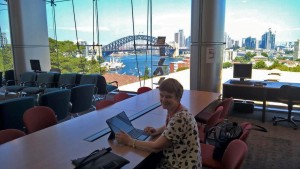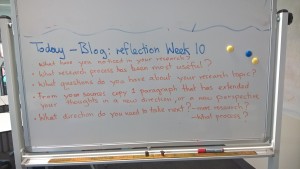
Project Zero Sydney 2016
I attended Project Zero at Shore School because it had a focus on the globalised classroom.
Young people are connected to one another around the globe in ways unimaginable just 20 years ago. How we as educators respond will influence the level of civic engagement, the ethics and the intellectual curiosity of an entire generation.
Carrie James and Shari Tishman inspired me with their session on Out of Eden Walk Learn and since then I have used the Out of Eden Dialogue Toolkit as

Research Project Questions from the Dialogue ToolKit: Out Of Eden Walk
‘thinking questions’ for my Research Project students and their blogs. Their answers reflected another perspective other than writing a source analysis. I also got positive feedback from my students that they enjoyed answering these thinking questions as a change from doing a source analysis. Below is an example of a student’s response to the question and to see more have a look at my students’ blogs.
I am curious as to why (my esearch) topic has gained particular interest over the last several years, and if there are any movements that this interest can be attributed to? I am also curious as to how we can objectively analyse and examine the role of women in film especially when using more subjective findings (which are based on subjective judgements) and if there is a way to increase the reliability of research that uses subjective instead of objective findings? Here is an excerpt from Source 1 that has extended my thinking about my research topic:…
Teacher Networking
Going to Project Zero has also given me a metalanguage to connect with other teachers. As part of developing a collaboration with a school in America I have had conversations with teachers who are interested in Project Zero and this has led me to discover Agency by Design and some great articles on slow thinking and maker empowerment.
The concept of maker empowerment is a dispositional concept, (with) three dispositional components: It emphasizes a sensitivity to the designed dimension of the world, along with the inclination to engage with the world through making, and the capacity (or ability) to do so.
So tonight as I read George Couros’s post on Where did
they learn it from? Who cares? I thought of how much I have learnt through these email conversations with other teachers and the directions they have led me.
For example, as I teach 3D printing and I am interested in the Maker Movement, I am now working with our Art department to use 3D modelling and printing as part of an art and architecture activity and the concept of Art Labs. This led to reading Jennifer Oxman Ryan’s article Maker Education Is About More Than 3-D Printers … and as wrote in Arts Integration Cafe
The maker movement is already infiltrating education in America. As more and more schools dedicate resources for maker classrooms, it is our responsibility as educators, researchers, parents, and policymakers to make sure that the thinking and learning behind maker-centered learning dictate the tools, rather than the other way around.

